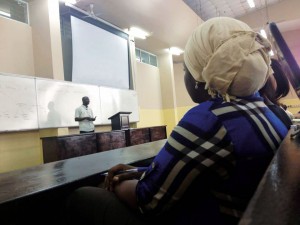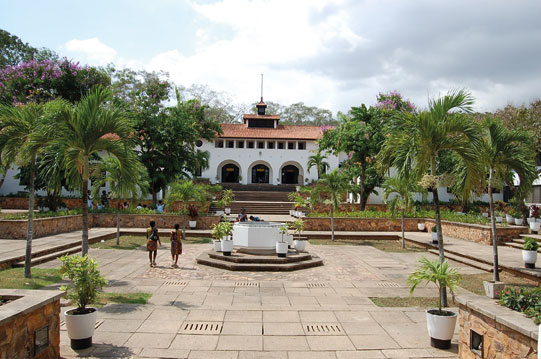Many of the future leaders and politicians of West Africa receive their education at University of Ghana. But the idea of a future free from corruption and poverty in one of the most stable democracies of Africa is more of a pipe dream than a dawning reality to the students of the country.

Photo: Jakub Horák
The clock strikes seven at University of Ghana this stuffy morning. The coral coloured walls stretch high towards the ceiling, where roughly a dozen fans are buzzing, struggling to cool the room. The smoke of small burning piles of trash outside the building mixes with strong scents of spices from various reasturants. The students are laughing and greeting their classmates loudly. Others are using the fickle internet connection for their smart phones. Some are resting their heads on the row of seats in front of them, trying to get as much sleep as possible before the first lesson of the day.
Today, Ghana has six government owned and roughly ten privately owned universities around the country. University of Ghana is considered the best of them all. Due to the lack of government funding and strikes among both students and teachers, not everyone in this country have received an education. However, according to UNICEF, roughly 80% of Ghana’s young population were literate in 2011.

Photo: Jakub Horák
The large, bright hallway outside glimpses through the classroom doorway. Three women in colourful dresses and headgear are selling bananas and plaintain chips to passing students. The light from the hallway is broken by the figure of a man appearing in the doorway. He is dressed in a traditional costume, revealing that he comes from the northern parts of Ghana. He slowly walks into the room. His assistant hands him a whiteboard marker when he reaches the teacher desk.
“Good morning,” he says with a powerful voice.
“Can someone name at least one of the challenges facing Africa, which slows its economic development?”
A few hands are raised while others start calling out their suggestions without being prompted.
“Agriculture that’s too repetitive,” a woman in the front row calls out.
“High inflation and corruption,” comes a voice from the back of the room.
A man in the third row starts squirming and hesitantly calls out:
“But isn’t corruption more of a cultural thing, um, I mean, should a country really have to change its culture in order to develop?”
The professor surveys the class, looking exceedingly pleased.
“Do the rest of you agree? Is corruption a cultural phenomenon?”
The room is filled with loud buzzing. After fifteen minutes it is no longer possible to hear what anyone says, and the professor interrupts them.
“Whether corruption is a cultural phenomenon or not is still debated, but two things are for certain. One: If corruption is a cultural phenomenon, then it’s a global one. Two: Regardless of this, corruption is harmful to our country’s and our continent’s future development.”
The fact that today’s lecture is about corruption seems fitting. As Ghana’s profits has increased, so has the fears of increased corruption. Kojo Mensah is sitting in one of the fringes of the classroom. He is studying political science, hoping to one day become a politician in Ghana, like his father. He shares his professor’s opinions about the harmfulness of corruption to the country, but does not have high hopes of solving the issue:
“I know it’s wrong and bad, but I need food on the table.”
“I mean it won’t matter what I try to do about it. There won’t be any change during my or my children’s lifetime. All that would happen is that I can’t afford to feed my family.”

Photo: Lisa Carmack
Kojo Mensah is not alone in having these thoughts. Lack of vision is a rule rather than an exception. Professor Kwesi Jonah has been a teacher of political science for over 20 years, and has taught many of the ministers and politicians of Ghana. Jonah is well aware of the problem, but emphasizes that corruption among politicians is not about poverty:
“The most corrupt in Africa are politicians. Ghana’s members of parliament earn about 3,500 US dollars a month. The average worker earns about 400 US dollars a month. And then I haven’t considered the perks. So this isn’t about poverty, it’s about greed.”
The future leaders of Ghana believe that this situation will not change for some time. But Jonah chooses to believe in a bright future:
“Corruption is a problem, but every new year brings students who are told why it is bad. I choose to expect a better future.”
Kojo Mensah is not the student’s real name.
READ MORE: “Corruption also nourishes pessimism”
Text: Sofia Molin
Translation: Marie Eriksson






